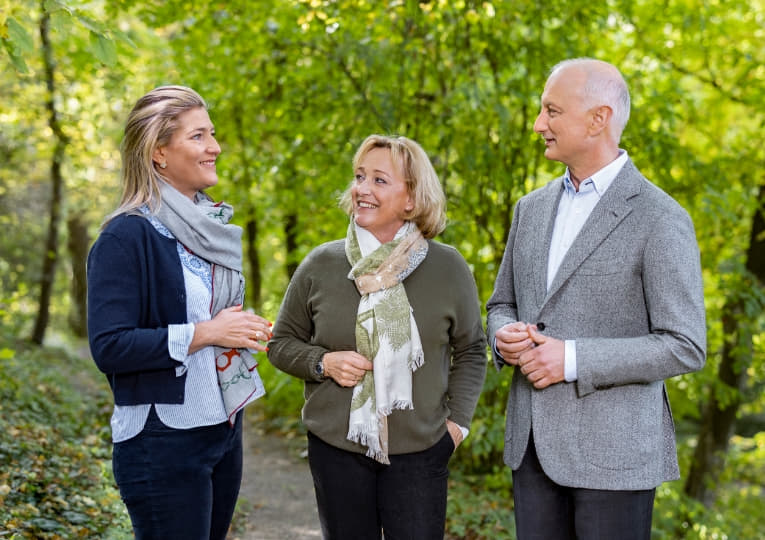From Waiblingen to the world
The STIHL Group is an international, family-owned business with roots in forestry that stretch back nearly 100 years. Everything we do has always been focused on people, nature, and their power to grow. That is what drives us – and what we want to keep driving forward.
The STIHL Group is a globally leading manufacturer of chainsaws and outdoor power equipment. Innovation, expertise, and premium quality have formed the foundation on which our wide and constantly expanding range of products is built ever since our founding by Andreas Stihl. Since 1971, STIHL has been the world’s top-selling chainsaw brand.
The STIHL Group is based in Waiblingen, in the German state of Baden-Württemberg. From there, we oversee activities around the globe in our international manufacturing and sales network. STIHL is active in over 160 countries through 42 sales and marketing companies, roughly 120 importers, and more than 55,000 authorized dealers. The STIHL production companies in our network manufacture a variety of components for other plants. Our international production network is made up of plants in seven countries (Germany, Brazil, Switzerland, Austria, China, the U.S., and the Philippines), including a magnesium foundry in Germany’s Eifel region, a saw chain plant in Switzerland, and the carburetor manufacturer ZAMA in Asia. This network allows us to achieve a vertically integrated depth of production of over 50 percent.
Business model
Our main area of expertise is the development, manufacturing, and sale of handheld power equipment for forestry, agriculture, landscape maintenance, construction, and private consumers. In addition to chainsaws, our line of products includes a wide range of other power equipment, such as brushcutters, hedge trimmers, blowers, mistblowers, cleaning systems, cut-off machines, earth augers, lawn mowers, and robotic mowers. Since 2009, STIHL has been increasingly focused on battery technology to complement its selection of gasoline and electric-powered equipment. In 2021, batteries and battery-operated tools accounted for roughly 19 percent of our overall sales. Fuels and lubricants, accessories, and personal protective equipment round out our product range. We provide our customers with additional support through digital solutions and services. STIHL Magnesium Diecasting (Weinsheim, Germany) and ZAMA are the only companies that serve customers outside our Group, in industries such as the automotive sector.
STIHL is also involved in developing sustainability-oriented business models. Through our corporate venture unit STIHL Digital GmbH, we invest in start-ups and enter into partnerships with companies such as Dryad and Fairown. Their innovations have the potential to support the development of forward-thinking solutions for our customers.
Investing in innovative start-ups

DRYAD – a start-up based in Eberswalde, Germany – is developing a system for the early detection of forest fires based on solar-powered sensors and wireless technology. The system is capable of covering expansive wooded areas beyond conventional mobile data networks.

FAIROWN – a start-up based in Tallinn, Estonia – makes software to support a sustainable circular economy. STIHL uses Fairown’s product-as-a-service solution to provide all-inclusive offers for certain products online that allow customers to use tools for a monthly fee instead of buying them.
Sustainable business
We are an independent, family-owned business with a long-term focus that acts with present and future generations in mind – in the interest of the company, our customers, our employees, and society. Our actions have always been guided by a keen sense of responsibility toward our staff, society, and the environment, as well as a consistent customer focus.
The superior quality of our products and services is designed to both satisfy and excite our customers. Today, we generate the lion’s share of our revenue (roughly 90 percent) outside Germany. Our capital structure is very solid, with an equity ratio of 70 percent. We can generally finance investments without the need for borrowing, allowing us to preserve our independence. We plan to increase our value creation in the long term and strengthen our competitive position so that we can stand firm and create secure jobs, even in times of crisis.
Fiscal year 2021
The sustained high demand for STIHL products, on the heels of strong growth in 2020, led to a significant rise in sales in both the gasoline-powered and battery-operated segments in 2021. Despite disruptions in supply chains around the world due to shortages of raw materials, production bottlenecks at suppliers, and limited transport capacities, STIHL was largely able to continue manufacturing across the Group. More than 20,000 employees Group-wide helped us achieve revenue of 5.06 billion euros (previous year: 4.58 billion euros), an increase of 10.4 percent year on year.
Corporate structure and governance
Our culture is based on values such as a consistent customer focus, respect for people and the environment, and a strong innovative drive. Our approach to corporate governance is guided by responsibility and sustainability. All STIHL companies – including the German founding company and its eight plants, as well as all international production and sales companies – are part of STIHL Holding AG & Co. KG. Since 2002, the STIHL Group’s business operations have been overseen by an independent Executive Board made up of six members. The owners make strategic decisions through the Advisory Board of STIHL Holding AG & Co. KG and the Supervisory Board of STIHL AG.
The Advisory Board is made up of eight members. The Supervisory Board is made up of twelve members, six of whom represent employer interests, and six of whom represent employee interests. The Chairman of the Advisory Board and the Supervisory Board is Dr. Nikolas Stihl, who took over the position from his father, Hans Peter Stihl, in 2012. Hans Peter Stihl is the Honorary Chairman of both boards and is the general partner of STIHL Holding AG & Co. KG.
RISK MANAGEMENT
In forward-looking businesses like ours, proactive risk management plays an integral role in decision-making and business processes. It is one of the many governance systems that the STIHL Group uses to measure, monitor, and manage risks. Each segment of the business tailors its risk management approach to its functional responsibilities. Group-level risks are regularly discussed, evaluated, and reported. In addition, the potential risk areas are reviewed and adapted annually so as to identify, evaluate, and counteract new and evolving risks in real time. Examples include climate change and IT security. The risk management process involves the use of globally standardized assessment principles and processes that are laid out in guidelines and directives. In organizational terms, the STIHL Group’s risk management system is overseen by the Group Audit department, which reports directly to the Chairman of the Executive Board. Risk management activities are the responsibility of the Executive Board and are communicated regularly to the Advisory Board. Together, they define further risks, which are then tracked by the individual departments and members of staff that are responsible for them. Every risk identified in the risk assessment is monitored and mitigated by taking appropriate measures.
Compliance
Compliance with legal requirements in every country in which STIHL Group companies operate is a baseline requirement for our business. STIHL takes a clear stance against corruption and bribery. Our values are firmly rooted in our corporate culture. They offer employees guidance on how to act internally within the Group and in dealings with third parties outside the Group.
Every STIHL company has local guidelines for ensuring compliance with applicable law both internally and in their dealings with business partners. The primary aim of these guidelines is to effectively prevent corruption and conflicts of interest while avoiding violations of antitrust law. We keep an eye on new legal requirements through constant monitoring and are in regular contact with outside experts. Employees receive regular training in line with their individual responsibilities. To minimize the risk of corruption, STIHL has rules on the separation of functions, approval processes, and the principle of dual control.
All operative compliance issues are coordinated by a Corporate Compliance Officer. The Corporate Compliance Officer reports to the Executive Board member for Human Resources and Legal Affairs, is the first point of contact for employees if they have questions about compliance, and works closely with the Group Audit, Risk Management, and Legal departments.
In order to continue ensuring the compliance of our business operations with the law and our corporate values, we are constantly working to enhance our compliance management system, which consists of three core elements: avoidance, early detection, and response. With this goal in mind, for example, a compliance risk analysis was performed at the founding company in 2021. The initial findings have been translated into specific measures that are now being implemented. The entire STIHL Group is scheduled to undergo a compliance risk analysis in 2022. Compliance risk analyses will be performed regularly going forward.
One key component of our efforts to avoid compliance violations is a comprehensive code of conduct that was developed for employees across the Group in 2021 and introduced in 2022. The code of conduct sets out detailed rules related to compliance. The training concept – which focuses on anticorruption and antitrust issues, as well as the new STIHL code of conduct – has undergone further enhancement as an additional preventive measure. The training program will be mandatory for all employees and will be expanded further for staff from divisions and departments that are exposed to particularly high risks. In Germany, a whistleblower system has also been introduced and is scheduled for a Group-wide rollout in 2022. The whistleblower system allows employees, business partners, and third parties alike to report well-founded suspicions, even anonymously. During the reporting period, the STIHL Group has been cooperating with the Bundeskartellamt, the German market competition authority, in an information procedure. The matter relates to a clause used in the past in some contracts between the STIHL sales company responsible for the German market and STIHL dealers.
STIHL Group companies and their employees are involved in a variety of associations and initiatives. Below are a few selected examples from Germany:
- EUROMOT – European Association of Internal Combustion Engine Manufacturers (Brussels, Belgium)
- DIHK – Association of German Chambers of Commerce and Industry (Berlin)
- CCI – Chamber of Commerce and Industry for the Stuttgart Region
- Südwestmetall – Metal and electrical industry employer association (Baden-Württemberg)
- UVSH – Unternehmerverband Südhessen (Darmstadt)
- VDMA – German Engineering Federation (Frankfurt am Main)
- vem.die arbeitgeber – Rhineland-Palatinate employers’ association (Koblenz)





